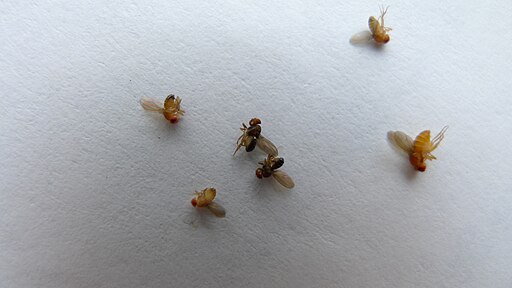
In one of the episodes of his popular 1990’s comedy show, Jerry Seinfeld featured a “close talker”: an overly friendly person who stands just a little too close to people when he talks with them. Although Seinfeld was able to squeeze a lot of humor from the subject, real-life “close talkers” tend to suffer from damage to their amygdala, the region of the brain which is highly involved in the regulation of emotions. People and rats with damaged amygdalas don’t just have difficulty with personal space, they also lose all sense of caution, failing to pick up on common indications of fear or aggression in others.
A new study of fruit flies has revealed another detail about the regulation of personal space, and it has to do with the neurotransmitter dopamine. Anne F. Simon of Western University found that fruit flies with too much dopamine preferred to group themselves close together, while those with little dopamine needed more social space. For humans who struggle with personal boundaries, such as those with schizophrenia or autism, this research is particularly illuminating, and offers hope for greater understanding.
Dopamine has already been implicated in human studies of introversion and extroversion. In these studies, fMRIs were used to monitor brain activity during different social situations. They found that while the nervous systems of extroverts were more energized by large amounts of dopamine, the nervous systems of introverts were over-stimulated.
Apparently, it is not quantity of dopamine in the brain that determines introversion or extroversion, but the way the nervous system responds to it. It follows, then, that if you’re an extrovert and you have a nervous system that responds well to dopamine, you will probably also be comfortable with close personal contact.
The next time you’re at a social gathering and someone either stands or sits a little too close to you, you needn’t take it personally. Just understand that this is probably a reaction to large amounts of dopamine affecting his amygdala, and then, let it go. 🙂
About the Author: Rebecca Wong has a BA in English Literature from the University of Waterloo and has been working in the herbal business since 2000. She studied at the Ontario College of Traditional Chinese Medicine under respected authorities Paul Des Rosiers and Vu Le, and graduated from the East West School of Planetary Herbology under Michael Tierra. She received training as a yoga teacher at The Branches in Kitchener/Waterloo, and therapeutic yoga teacher training from the School for Somatic Soulwork under Deniz Aydoslu. She now teaches yoga for anxiety, depression and burnout at Rebecca's Restful Yoga Studio in Toronto.
